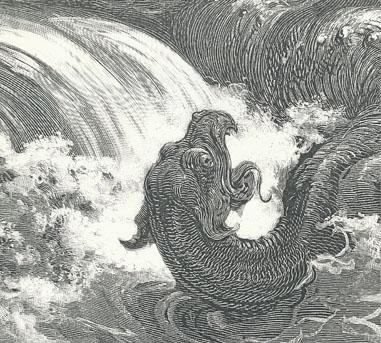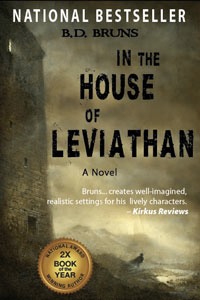In the House of Leviathan is a beautifully realized horror novel
FTC Statement: Reviewers are frequently provided by the publisher/production company with a copy of the material being reviewed.The opinions published are solely those of the respective reviewers and may not reflect the opinions of CriticalBlast.com or its management.
As an Amazon Associate, we earn from qualifying purchases. (This is a legal requirement, as apparently some sites advertise for Amazon for free. Yes, that's sarcasm.)

In The House of Leviathan by B.D. Bruns
Printed by: World Waters
$15 on Amazon ($9.99 for Digital)
When I started to write this review, it occurred to me that I haven’t reviewed a novel in a long time. The last time was probably 15 years ago when I was still at Rutgers for a "Criticism" class I was taking under the terrific Terry Teachout. Just as an aside, Rutgers has a great journalism program, and they really shaped the writer I am today. So if you like my reviews, you can thank them. If you hate them, you can blame them. I prefer not to take personal responsibility for my actions…
I have long been a fan of horror novels. My mom turned me on to Stephen King when I was real young, and as I got older, I fell in love with Clive Barker, John Saul, Joe Hill, and classic authors like Poe, Shelley, Stoker, Blatty, and Lovecraft. So when RJ asked if anyone would be interested in reviewing In The House of Leviathan, I jumped at the opportunity. It was hard to pass up, especially when I saw the book’s press release: “What Happened to Scary? Horror Has Been Hijacked By Glittering Vampires and Teen Drama.”
 I am very happy to say that In The House of Leviathan has much more going for it than just a catchy press release.
I am very happy to say that In The House of Leviathan has much more going for it than just a catchy press release.
In the House of Leviathan is set in Italy in the 1860’s. Giuseppe “Achilles” Apuzzo runs the family paper mill in the town of Amalfi. Achilles was wounded in battle helping unite Italy under the Pope. His older brother is a soldier haunted by the war, and his younger sister, Carmelina is in love with a local fisherman named Lucio. The Apuzzo family’s mill comes under the influence of what they believe is the demon Leviathan. While this is going on, the town of Amalfi is transitioning to a new priest. The church has sent young firebrand Father Fabriano to take over from the elder Father Milani. Fabriano claims to have experience with exorcism and is eager to take on the devil once more.
In the end, we find out that the ghosts and terrors haunting the Apuzzo family and the town of Amalfi are of a much more personal nature for many of the residents, including Father Milani. It’s not a story about the devil at all; it’s a tragic love story accidentally unearthed by the Apuzzos while looking for rags to turn into paper.
The first thing that stood out to me about In the House of Leviathan was the deep and intricate descriptions of the setting. Bruns does a beautiful job painting a picture in the reader’s mind. I have never been in a Italian paper mill in the 1860’s, but part of me feels like I know exactly what one looks like because of the time Bruns takes to set the mood. But, he also has a real deft touch, keeping things light and quick. He never uses pages and pages to set the scene. Instead, he focuses on using words masterfully, setting the scene without going on and on. He never lets his descriptions get in the way of a tight story:
“The Apuzzo paper mill was an oddly shaped affair, as intricate and intimate with purpose as the yard and its pools, chutes, and canal. Through the course of several family dynasties of paper millers a stone house had risen atop the workshop. Every corner was smoothed with age, use, and love, with a new room or staircase added was of stone blocks but for the wooden drying tower perched atop the roof.”
Bruns also does a terrific job constructing these characters. In too many horror books, the characters feel like pawns in the service of moving the story forward. But here, all of the characters have deep personalities. They feel like they have lived long lives before we encountered them on the pages. They share secrets and inside jokes. There is a whole world here, and Bruns captures it perfectly. I especially loved the relationship between Achilles and Carmelina. I truly believed they were brother and sister from the way they treated each other: that perfect blend of love and torment you can only get with a beloved sibling. I saw a lot of my relationship with my own sister here, which helped personalize this story for me.
Father Fabriano was also real fully developed, often in subtle ways. Bruns doesn’t hit the reader over the head with exposition, but you can tell his doesn't like Fabriano all that much, and the reader probably shouldn't either. Just in describing the way Fabriano eats, you get a sense of how much of a vile character he is deep down
“In one motion Fabriano snatched up his grappa and quaffed it. Carmelina marveled at the arrogance of men, wondering how many times he had practiced that recitation in front of a mirror. They waited for him to continue, but instead he focused his attention entirely on the food. He piled the wide, thin slices of fatty ham high on his plate. He then placed a variety of difference cheeses atop it, took the whole pile with both hands and devoured it.”
Another thing I loved about this book is how subtle the horror was for the most part. Most of the "horrors" are subtle, almost feeling like pranks more than true horror especially in the early moments of the book. This helped build up the tension, especially when the BIG moments happened like Achilles’ brother getting chewed up by the paper mill’s shredder. By the end, we do get some much bigger “scares,” but at that point, they had been built up brilliantly where you feel they fit the story perfectly. I especially liked Lucio's struggles, when he's trapped under water trying to get loose a tangled fishing net. At that point, it felt like anything could happen, even losing a major character in such a horrible way.
I also liked that as the book comes to a close, we find out that everything going on here is really a love story. Achielles is being pursued by a local woman whose husband was a deserter. Carmelina is being pursued by Lucio, who never gets a real chance to be a hero. And even the horrible things going on here started as acts of love. Twisted acts of love, but love none the less.
I want to point out that even the “leviathan” who is haunting the Appuzo family has some deep personality traits. He’s cruel and violent, but goes out of his way to protect children and the frail. This makes the final conflict between Achilles and the “leviathan” particularly poignant. Achielles’ leg is lame because of cannon fire during the war, and the leviathan seems uncertain what to do with him as result. I should also point out that while kind of quick, the ending was very satisfying. It definitely felt like a full and complete story when you are done.
Bruns has created a brilliant novel here. He mixes horror, love story, and detailed descriptions of a beautiful historical setting with a perfect balance. What is really amazing is that Bruns achieves all this in a relatively short book. I am used to reading Stephen King’s tomes, which can weigh in at 600-1000 pages. Bruns keeps it flowing quick and smooth, giving you a ton of story and characterization in just about 250 pages. 250 pages that are VERY difficult to put down once you start reading them.
In The House of Leviathan is definitely worth checking out! This is the first book I have read by BD Bruns, but I will be coming back for more. I already have my eye on his collection of short stories, The Gothic Shift.


